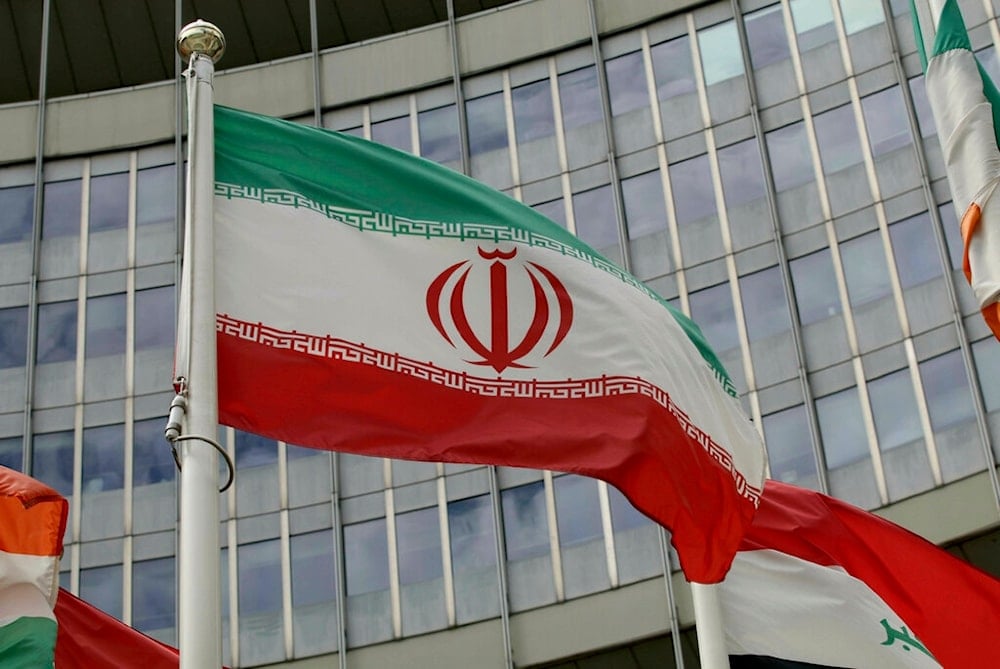Snapback mechanism risks EU's global diplomatic credibility: Analysis
Sina Toossi warned that Europe's snapback sanctions move risks collapsing diplomacy with Iran, while Tehran condemned the decision as illegal and vowed an appropriate response.
-

The Iranian flag waves outside of the UN building that hosts the International Atomic Energy Agency, IAEA, office inside in Vienna, Austria, Wednesday, July 10, 2019. (AP)
An analysis published by writer Sina Toossi for The Responsible Statecraft on Thursday argued that Europe is preparing to move from threats to action by triggering the United Nations "snapback" sanctions mechanism against Iran, a step that could deepen tensions and undermine diplomacy.
The measure, created under the 2015 Joint Comprehensive Plan of Action (JCPOA), allows for the automatic reimposition of international sanctions if Iran is deemed non-compliant. Unlike normal Security Council procedures, once snapback is invoked, a 30-day countdown begins, after which sanctions return unless the Council votes to maintain their suspension, meaning any permanent member can restore them with a single veto.
A coercive strategy
According to Toossi, the E3 (France, Britain, and Germany) are pressing ahead with this step ahead of the October 18, 2025, deadline, when UN sanctions would otherwise expire permanently. He argued that while the move is designed to pressure Tehran into compliance, it risks shutting the door on negotiations at a critical juncture.
Tracing the unraveling of the JCPOA back to 2018, Toossi recalled that then-US President Donald Trump withdrew from the accord and reimposed sweeping sanctions despite IAEA findings that Iran was meeting its obligations. European governments pledged to shield Iran from Washington's pressure but failed to deliver meaningful economic relief, prompting Tehran by 2019 to exceed enrichment limits and expand its stockpiles.
The analysis further noted that joint US-Israeli strikes on Iran's nuclear facilities this summer triggered Tehran to suspend cooperation with the IAEA and expel inspectors. Against this backdrop, Toossi warned, the E3 snapback initiative looks less like a path toward dialogue and more like a coercive strategy aimed at extracting immediate concessions.
Iran's response
Hours after the E3 notification, Iran's Foreign Minister Abbas Araghchi condemned the move as "illegal and unjustified", vowing that Tehran would respond "appropriately to protect and guarantee its national rights and interests." He urged the Europeans to "correct this wrong decision" in the coming days and cautioned that their future role in nuclear diplomacy could be jeopardized.
Iran maintains that it has never pursued nuclear weapons and ties cooperation with the IAEA to domestic parliamentary and National Security Council approval. Although inspectors returned in August after the June strikes, Tehran insists disagreements over inspection scope remain unresolved.
Read more: Europe has no right to invoke snapback mechanism under JCPOA: Azizi
Risks of escalation
Toossi warned that the credibility of the UN Security Council itself is at stake. Enforcement of sanctions could fracture, he argued, as Russia and China are expected to reject unilateral measures and have already called for a six-months delay to allow diplomacy to continue.
More concerning, the analysis noted, Iran could escalate its nuclear program or even reconsider its membership in the Nuclear Non-Proliferation Treaty (NPT), a move once taken by the DPRK. Such steps would mark a dangerous turn away from global non-proliferation norms.
Alternative path forward
Instead of coercion, Toossi suggested Europe could pursue an interim arrangement, extending Resolution 2231 timelines, pairing them with reciprocal steps, and offering targeted sanctions relief to restore inspector access and sustain monitoring. "This is the essence of diplomacy: measured give-and-take, not unilateral demands in exchange for nothing," he wrote.

 3 Min Read
3 Min Read










